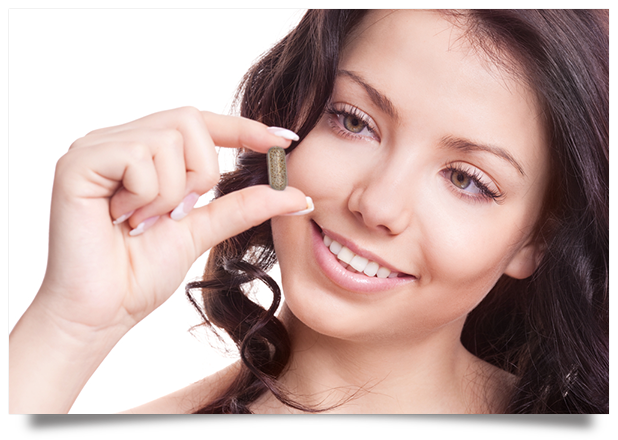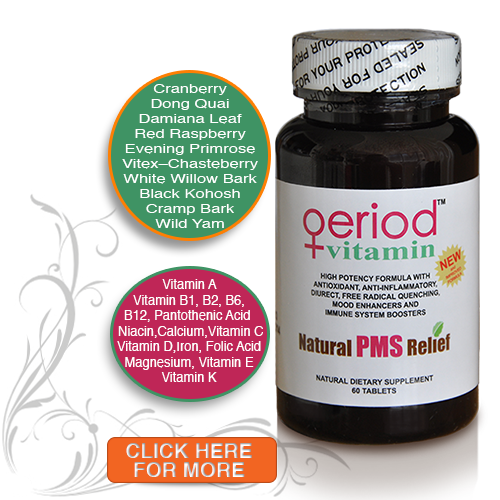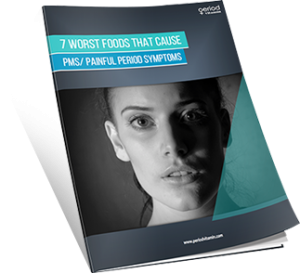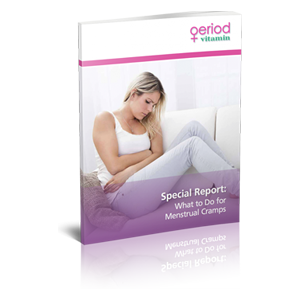In the most ideal world, you would never need supplements for period cramps. However, it’s nearly impossible to go through life without a higher need for vitamins and minerals.
Blood is a rich source of iron, and by bleeding, you end up losing iron naturally. For example, when you’re having your period and bleeding more than usual, your body is losing iron that is usually re-circulated in the body.
Because you bleed naturally during your period, this is why the recommended amount of iron is much higher for women than men. The bottom line is that unless you make up the amount of iron lost during your period in your diet, you’ll end up deficient.
Your Lifestyle Increases the Needs of Vitamins and Minerals, Too

When you are stressed due to what’s happening at work, with your relationship, or with your health, your needs for the B vitamins and zinc increases. When you’re having PMS, it’s a signal that your body is having a difficult time with the hormone regulation, something that an herbal supplement could potentially help.
When you’re pregnant, your vitamin and mineral needs, including that for calcium and iron increase. Without them, your body goes into deficiency status, and you end up suffering. Whenever you have any disease, your need for different vitamins and minerals increases. The specific vitamins and minerals that increase depend on the disease; each one is different.
If you don’t turn to all natural supplements such as vitamin supplements and an herbal supplement, or more specifically supplements for period cramps, you’ll end up using over-the-counter drugs or prescription medications that cause an additional burden on your body because they aren’t natural. These substances have to be detoxified by your liver, and not coincidentally, it’s the liver that is in need of cleansing with PMS.
What Supplements to Take for Menstrual Cramps
The best supplement to prevent menstrual cramps would be the one that contains everything your body needs; one that’s formulated for you during this time of the month. A “period vitamin” is a term used for such a nutritional supplement.
For example, a period vitamin could include more nutrients than that found in a bottle of other vitamin supplements on the market, including those that contain herbs and other supplements such as vitamins and minerals.
Here’s an example of the ingredients a period supplement could contain:
- Vitamin A – In adequate amounts, this vitamin shortens the amount of time you might have infections of the reproductive tract.
- Vitamin B Complex (thiamine, riboflavin, niacin, pyridoxine, folic acid, Vitamin B5 and Vitamin B12) All vitamins of the B complex group are important to you during your period.
Here’s a short breakdown of how important each one of them is:
- Thiamine helps you keep a positive attitude and stabilizes your appetite. Deficiency symptoms include loss of appetite, irritability, loss of memory, constipation, indigestion, and confusion.
- Riboflavin is vitamin B2. It’s needed for enzymes to break down and metabolize the food you eat. A deficiency can cause digestive upsets, sensitivity to light, vaginal itching and sluggishness.
- Niacin is vitamin B3. If you’ve been gorging on sugar and starches, you’ve been depleting your body’s stores of niacin. Without it, you can’t synthesize sex hormones.
- Vitamin B5 is pantothenic acid. Of all the B vitamins, this one is especially important for handling stress.
- Vitamin B6 is especially important for theregulation of blood sugar levels. A deficiency of vitamin B6 causes nervousness, irritability, depression and water
 retention.
retention.
- A vitamin B12 deficiency causes menstrual disturbances, nervous irritability, depression, lack of sleep, and memory loss.
- Vitamin C – This vitamin helps form new red blood cells and is needed in higher amounts when you’re under stress.
- Vitamin D3 – Although vitamin D has not been specifically found to affect women during their period, the vitamin is important for calcium to be absorbed. Low levels of calcium could contribute to cramping. Studies on vitamin D in the last few decades show that many people are deficient.
- Vitamin E – This vitamin prevents blood clots from forming.
If you have menstrual cramps, do consider getting a period vitamin. You can truly impact the way you feel during your period and start to replenish your nutrients. It’s a win every way you look at it.



